
On July 17 and 18, CLEAR Faculty Fellows for the 2022-23 academic term presented their projects before Northeastern University School of Law faculty, staff and students, gathered online and in the Moot Courtroom in Dockser Hall.
The Center for Law, Equity and Race (CLEAR) expanded the Racial Justice Faculty Fellows concept, initiated by Dean James Hackney in 2021, to support a diverse cohort of new and emerging scholars at the law school.
The faculty fellows’ projects covered several issues of importance to Black, Latinx and Asian communities such as access to housing; barriers to small business development; empowering parents in child welfare encounters; and strategies to address gentrification displacement.
Additionally, there was research in the theoretical arena exploring the historic impact of race and arguments on birthright citizenship; and arguments to support an affirmative duty by the federal government to further fair housing in communities.
“We believe the work of our Faculty Fellows will be important contributions to the understanding and expansion of opportunities needed to bring about meaningful change for our communities,” said Dr. Deborah A. Jackson, CLEAR managing director. “We will continue to look for more opportunities to engage other faculty members in this work.”
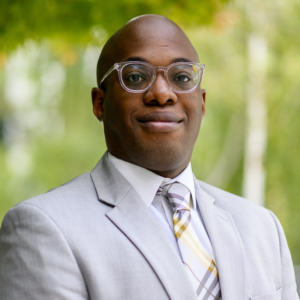 The presentations started with E. Darryl Walton, associate clinical professor and director of the Community Business Clinic, who brings a seasoned practice career to the Clinic. During his practice, he encountered barriers to business growth in the form of direct and indirect costs that disproportionately impact new entrants in commercial spaces, including his BIPOC business clients. Drawing on his experiences as a practitioner, Walton’s project, titled “Small Businesses and Startups Still Stymied by Substantial LLC Registration and Maintenance Fees” examined the effects of costs associated with starting a new business in the state of Massachusetts, compared to surrounding jurisdictions. Walton focuses largely on LLC registration fees, maintenance fee structures, and incentives for economic business zones.
The presentations started with E. Darryl Walton, associate clinical professor and director of the Community Business Clinic, who brings a seasoned practice career to the Clinic. During his practice, he encountered barriers to business growth in the form of direct and indirect costs that disproportionately impact new entrants in commercial spaces, including his BIPOC business clients. Drawing on his experiences as a practitioner, Walton’s project, titled “Small Businesses and Startups Still Stymied by Substantial LLC Registration and Maintenance Fees” examined the effects of costs associated with starting a new business in the state of Massachusetts, compared to surrounding jurisdictions. Walton focuses largely on LLC registration fees, maintenance fee structures, and incentives for economic business zones.
 Rachel Rosenbloom, CLEAR immigration justice fellow and professor at Northeastern Law, delivered her project, “Race, Borders, and Birthright Citizenship.” Her presentation showcased the ideas at the heart of her latest book, Citizenship for Some: White Nationalism and the Long Roots of the Movement to Restrict Constitutional Birthright Citizenship. Tracing the origins of the contemporary movement to limit birthright citizenship, Rosenbloom’s work examines the numerous efforts of anti-immigrant activists in the late nineteenth and early twentieth centuries to restrict the scope of the Citizenship Clause of the Fourteenth Amendment through litigation and proposed constitutional amendments. It also explores the more hidden, bureaucratic life of the Citizenship Clause.
Rachel Rosenbloom, CLEAR immigration justice fellow and professor at Northeastern Law, delivered her project, “Race, Borders, and Birthright Citizenship.” Her presentation showcased the ideas at the heart of her latest book, Citizenship for Some: White Nationalism and the Long Roots of the Movement to Restrict Constitutional Birthright Citizenship. Tracing the origins of the contemporary movement to limit birthright citizenship, Rosenbloom’s work examines the numerous efforts of anti-immigrant activists in the late nineteenth and early twentieth centuries to restrict the scope of the Citizenship Clause of the Fourteenth Amendment through litigation and proposed constitutional amendments. It also explores the more hidden, bureaucratic life of the Citizenship Clause.
Professor Rosenbloom argues that despite the Fourteenth Amendment’s guarantee of citizenship without regard to race, birthright citizenship’s racialized origins have shown a persistent tendency to resurface in the context of immigration enforcement efforts. Whether targeting Chinese Americans during the Chinese Exclusion era, Mexican Americans in the 1930s, or in recent decades, a broad spectrum of Black and brown Americans have been swept up by a racialized mass deportation system that has become increasingly intertwined with a racialized system of mass incarceration.
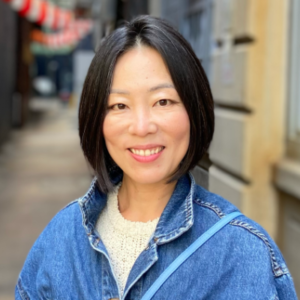 Lily Song, assistant professor of Race and Social Justice in the Built Environment, at Northeastern University’s College of Arts, Media and Design, shared her work “The ARTery: Re-imagining and Re-formulating Spatial Planning and Development with Local Communities in Roxbury.”
Lily Song, assistant professor of Race and Social Justice in the Built Environment, at Northeastern University’s College of Arts, Media and Design, shared her work “The ARTery: Re-imagining and Re-formulating Spatial Planning and Development with Local Communities in Roxbury.”
Professor Song is an urban planner and activist-scholar who studies long-term community engagement practices. Her research focuses on the relations between urban infrastructure and redevelopment initiatives, socio-spatial inequality, and race, class and gender politics in American cities and other decolonizing contexts.
During her fellowship year, Professor Song partnered with Boston public officials to design cultural interventions that target the gentrification trends and displacement pressures in Roxbury. The ARTery project seeks to use public art to amplify cultural identity, economic opportunity and social cohesion among neighborhood residents. Professor Song works with community-based artists, activists and small business owners to generate public art.
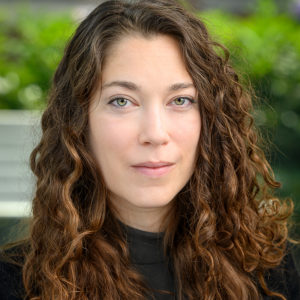
Day two of presentations began with Rebecca Chapman and her discussion of the vacuum in rights protection for families exposed to New York City’s child protective services system.
Chapman, CLEAR criminal justice fellow, is also a social justice teaching fellow at the Legal Services in Social Context Program. Alongside social justice organizations, public defender groups in New York, and her students at Northeastern Law, Chapman’s project, “Keeping Families Together: Miranda Rights for Parents in the Predatory Family Policing System,” proposes a framework that supports the efforts of The Bronx Defenders, a New York public defender organization. Chapman’s work seeks to promote state legislation that would promote the right of families to be informed of their legal rights at their first point of contact with workers from the child protection system. Her work hopes to reduce the amount of time that families are separated during child protection investigations.
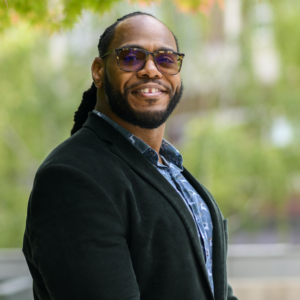 Melvin J. Kelley IV, an associate professor of law and business at Northeastern University School of Law and D’Amore McKim School of Business, presented next. His project, titled “Beyond the Perpetrator’s Perspective on Golden Ghettos: Reinterpreting Fair Housing Through the Lens of Transitional Justice” focused on the Fair Housing Act of 1968. Professor Kelley’s research examines whether approaches from the human rights field of transitional justice might assist in the interpretation and implementation of the provision of “affirmatively furthering fair housing.” During his fellowship, he met with scholars in a range of disciplines who are exploring how to remediate enduring legacies of historical race-based oppression, to assist in the evaluation of prospects for redressing contemporary inequities in real property ownership and regional maldistributions of resources across racialized spaces.
Melvin J. Kelley IV, an associate professor of law and business at Northeastern University School of Law and D’Amore McKim School of Business, presented next. His project, titled “Beyond the Perpetrator’s Perspective on Golden Ghettos: Reinterpreting Fair Housing Through the Lens of Transitional Justice” focused on the Fair Housing Act of 1968. Professor Kelley’s research examines whether approaches from the human rights field of transitional justice might assist in the interpretation and implementation of the provision of “affirmatively furthering fair housing.” During his fellowship, he met with scholars in a range of disciplines who are exploring how to remediate enduring legacies of historical race-based oppression, to assist in the evaluation of prospects for redressing contemporary inequities in real property ownership and regional maldistributions of resources across racialized spaces.
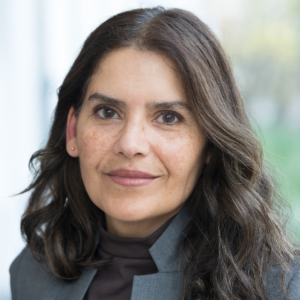 Rounding off two days of inspiring and thought-provoking presentations, Ana M. Rivera, an associate clinical professor and director of the Housing Rights Clinic at Northeastern Law, gave her illuminating presentation, "The Disparate Impact of Unconscionable Lease Provisions in the Era of post-Covid.”
Rounding off two days of inspiring and thought-provoking presentations, Ana M. Rivera, an associate clinical professor and director of the Housing Rights Clinic at Northeastern Law, gave her illuminating presentation, "The Disparate Impact of Unconscionable Lease Provisions in the Era of post-Covid.”
Professor Rivera is the founder and director of Northeastern Law’s Housing Rights Advocacy Clinic. Through individual representation, the new clinic addresses legal issues faced by low-income communities. In her experience as a practicing housing rights lawyer, Rivera litigated cases involving residential leasing practices that disparately affected BIPOC and tenants from poor communities. These practices prevailed in the COVID era and exacerbated exponentially the pressures on renters and recipients of benefits such as ERAP (Emergency Rental Assistance Program) and Section 8 support. During her fellowship year, Rivera examined how these initiatives harmfully impact low-income renters and explored potential reforms to address this issue.